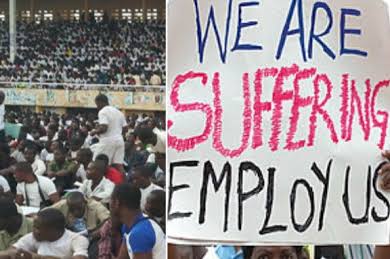
Unemployment rate jumps by 4.2% in Q2, 2023 – NBS
Amid further rise in food inflation in the country, the National Bureau of Statistics (NBS) has disclosed that Nigeria’s unemployment rate jumped by 4.2 percent in the second quarter of 2023.

In its recently released report, the NBS said the figure was a marginal increase of 0.1 percent from 4.1 percent recorded in Q1 2023.

According to the NBS, the reports was produced using the bureau’s newly adopted methodology which was made public in August – where the NBS defined employed persons as individuals who work for at least one hour in seven days.
The report explained that 80.4 percent of Nigeria’s labour force in the working-age population participated in the survey and that unemployment rate among men was 3.5 percent and 5.9 percent among women.
“Disaggregation by location, the unemployment rate was 5.9 percent in urban areas and 2.5 percent in rural areas,” the report added.
Furthermore, the report indicated that youth unemployment also increased in Q2 of 2023.
“In Q2, 2023, the proportion of youth (15-24 years) identified as NEET was 13.8. An increase from 12.1% and 10% in Q4, 2022 and Q1,2023 respectively,” the report disclosed.
It would be recalled that the NBS in its newly-released Consumer Price Index for November 2023 report unveiled, last Friday, said headline inflation has raced to 28.20 per cent in November from the 27.33 per cent figure recorded in October, this year.
According to the NBS, Nigeria’s food inflation has surged to a staggering 32.84 per cent. The food inflation rate in November was 8.72 percentage points higher than what was recorded in November 2022 (24.13 per cent).
The report showed that the rise in food prices was caused by increases in the prices of bread and cereals, oil and fat, potatoes, yam and other tubers, fish, fruit, meat, vegetables and coffee, tea and cocoa.
“On a month-on-month basis, the food inflation rate in November 2023 was 2.42% this was 0.51% higher compared to the rate recorded in October 2023 (1.91%).
“The average annual rate of Food inflation for the twelve-months ending November 2023 over the previous twelve-month average was 27.09%, which was a 6.68% points increase from the average annual rate of change recorded in November 2022 (20.41%).”
NBS disclosed in its report that the cost of food rose highest in Kogi, Kwara, and Rivers where food inflation in each state surged to 41.29 per cent, 40.72 per cent, and 40.22 per cent respectively, while the same was cheapest in Bauchi (26.14%), Borno (27.34%), and Jigawa (27.63%).



